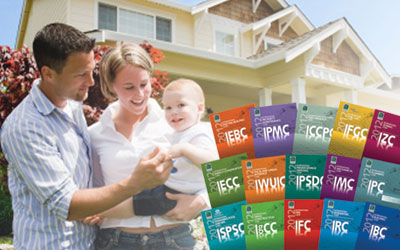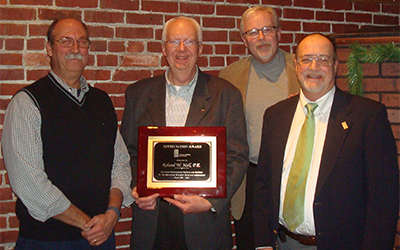
| —*ADVERTISEMENT— |
 |
 |
|
| GRapevine Year in Review | |
 |
|
| DBOA Honors Hall for Years of Service | |
 |
|
| IAS Accreditation Committee Meeting Webcast February 10 | |
| —*ADVERTISEMENT— |
 |
| Using Current Codes Demonstrates Commitment to Safety, Savings Thirty-two states have updated to the 2012 International Codes at the state or local level.  The development of current codes and standards by International Code Council members supports the building industry in the construction of safe and resilient homes and buildings. In addition to safety, up-to-date codes also have positive economic impacts. Building in compliance with the International Codes (I-Codes) can keep construction costs down, lower insurance rates and reduce utility bills. In 32 states at least one of the 2012 I-Codes has been adopted at the state or local level, according to voluntary reporting. The development of current codes and standards by International Code Council members supports the building industry in the construction of safe and resilient homes and buildings. In addition to safety, up-to-date codes also have positive economic impacts. Building in compliance with the International Codes (I-Codes) can keep construction costs down, lower insurance rates and reduce utility bills. In 32 states at least one of the 2012 I-Codes has been adopted at the state or local level, according to voluntary reporting."When states and cities adopt the most recent codes available, it is a strong indication of a state or city's commitment to maintaining the highest safety standards possible in the built environment," said ICC Board President Stephen Jones, CBO. "Using current codes also can result in lower prices for home and commercial property insurance." All 50 states and the District of Columbia have adopted the International Building Code statewide or locally with the majority using the 2012 or 2009 edition. The International Residential Code is used in 49 states; the International Energy Conservation Code in 47 states; the International Mechanical Code in 46 states; the International Fuel Gas Code in 43 states; the International Fire Code in 42 states; and the International Plumbing Code in 35 states. "Advances in building science and new products along with lessons learned are key components in each new edition of codes and standards," said ICC CEO Dominic Sims, CBO. "Older code editions make it less effective to build to the highest level of safety and affordability." Read more. |
| Back to top |
Grow Your Knowledge with Campus Online
|
| Back to top |
New York City Construction Codes Revisions Passed by City Council
|
| Back to top |
| —*ADVERTISEMENT— |
 |
| Public/Private Sector Collaboration Improves Building Safety ICC Code Development Process Is the Way for Feds to Put Research into Action Federal agencies conclude and agree that code adoption and compliance, training for code officials and updating codes based on lessons learned from natural disasters are major factors in creating more resilient structures and safer communities. "When homes and buildings are built to the most current codes, structures on the edge of the direct path of a tornado or hurricane should be able to survive," said International Code Council CEO Dominic Sims, CBO. "That was the conclusion by the University of Alabama after studying tornado damage in Tuscaloosa. It mirrors findings from the Federal Emergency Management Agency (FEMA) and the National Institute of Standards and Technology (NIST). It is about reducing damage." Federal, state and local governments benefit from their involvement in the ICC code development process without taking on the high cost of developing codes and standards. "The FEMA and NIST findings reaffirm the importance of public and private sector collaboration to develop building safety codes," said ICC Board of Directors President Stephen Jones, CBO. "Government can put valuable research into action by participating in the ICC code development process, and using ICC as an established resource to turn to for code official training and certification." Read more |
| Back to top |
IRC Named Primary Standard for U.S. DOE Weatherization Demonstrating how the I-Codes support the construction industry and government, the National Renewable Energy Lab says the 2012 International Residential Code for One- and Two-Family Dwellings serves as the primary referenced standard. The specifications are based on 30 years of building science expertise. Read more |
| Back to top |
U.S. Treasury Department Report Advocates Statewide Codes The report from the Federal Insurance Office says data supports the adoption of statewide building codes to save lives and reduce the cost of property damage. The report cites a study that estimates building codes would have reduced wind damage from Hurricane Katrina by 80 percent, saving as much as $8 billion. Read more |
| Back to top |
| —*ADVERTISEMENT— |
 |
 |
 |
| GRapevine Year in Review The International Code Council Government Relations (GR) department was as busy as ever in 2013, with scores of states and local jurisdictions adopting the International Codes (I-Codes), working with the Code Council-led Coalition for Current Safety Codes, and with the High School Technical Training Program continuing its growth, and lots more. Take a look at some more of the highlights of the year: |
|
| Back to top |
| —*ADVERTISEMENT— |
 |
 |
 |
DBOA Honors Hall for Years of Service Last month the Delaware Building Officials Association (DBOA) honored Roland Hall for his years of support and service to the Chapter. Hall retired in December after 25 years with the Code Council, where he represented the states of Delaware, Connecticut, New Jersey and West Virginia for ICC's Government Relations Team. Hall is pictured at the Chapter meeting in Newark, Del., with DBOA President Marc St. Jean (left), Code Council Board of Directors President Stephen D. Jones (second from right), and Board Director William R. Bryant (right). Last month the Delaware Building Officials Association (DBOA) honored Roland Hall for his years of support and service to the Chapter. Hall retired in December after 25 years with the Code Council, where he represented the states of Delaware, Connecticut, New Jersey and West Virginia for ICC's Government Relations Team. Hall is pictured at the Chapter meeting in Newark, Del., with DBOA President Marc St. Jean (left), Code Council Board of Directors President Stephen D. Jones (second from right), and Board Director William R. Bryant (right). |
| Back to top |
Share Your Chapter News with Us Have a recent meeting you'd like to share with your fellow Chapters? Did you start a new program, elect new officers, have a successful training session or recognize a fellow Chapter member? Let's show our Chapter pride by sharing all the great things chapters do throughout the year in the name of public safety. Send your photos, captions and Chapter news items to chapters@iccsafe.org. We'll see that they are published in an upcoming edition of ICC eNews. |
 |
 |
| For decades, the ICC Evaluation Service (ICC-ES) has been the industry leader in performing technical evaluations for code compliance, providing regulators and construction professionals with clear evidence that products comply with codes and standards. Having completed hundreds of evaluations of building products, components, methods and materials, ICC-ES has a proven track record of excellence in product evaluations. This record extends to reports regarding sustainability under standards such as the California Green Building Standards Code (CALGreen), the International Green Construction Code (IgCC) and other green rating systems. |
ICC-ES Evaluation Reports, Building Product and PMG Listings Lead the Industry
|
| Back to top |
| —*ADVERTISEMENT— |
 |
| In Other ICC-ES News |
| Register Now for the Complimentary Webcast of the ICC-ES Evaluation Committee Meeting, Feb. 11 |
| Learn More about the ICC-ES Building Product Listing Program |
| Video: How to Read ICC-ES Evaluation Reports |
| Earn CEUs — Attend the Free ICC-ES Webinar: Approving or Selecting Building Products with Confidence |
| Back to top |
 |
 |
| The International Accreditation Service (IAS) provides objective evidence that an organization operates at the highest level of ethical, legal and technical standards. IAS is a nonprofit, public-benefit corporation that has been providing accreditation services since 1975. IAS accredits a wide range of companies and organizations, including governmental entities, commercial businesses and professional associations. IAS accreditation programs are based on recognized national and international standards that ensure domestic and/or global acceptance of its accreditations. |
IAS Accreditation Committee Meeting Webcast February 10
|
| Back to top |
 |